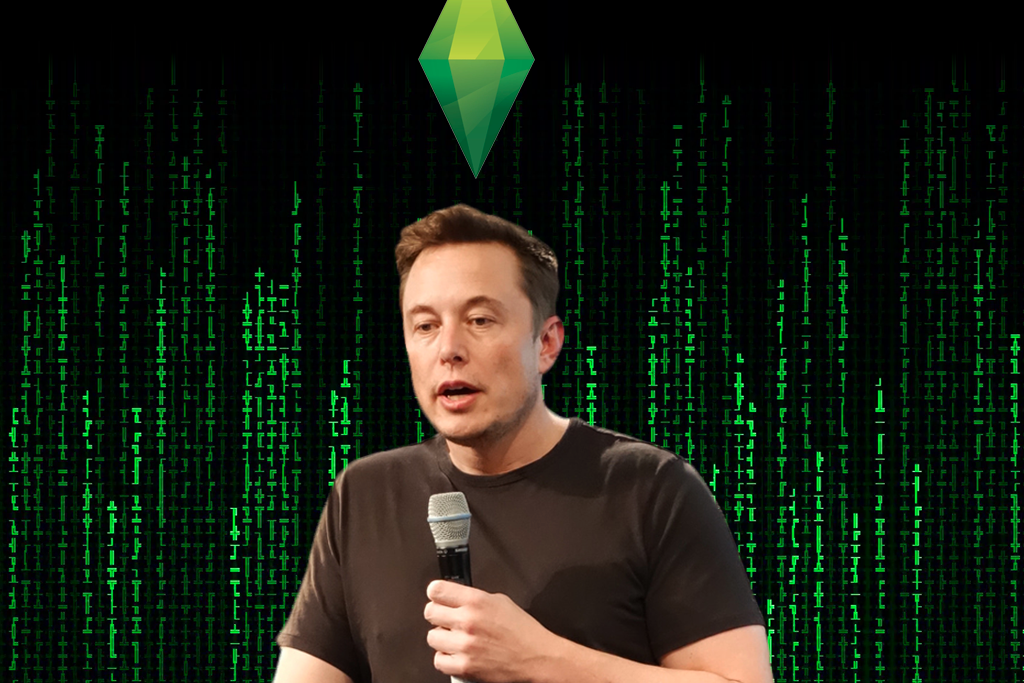There Is Solid Evidence We’re All Living In A Simulation

Have you ever wondered why you wandered into a room and forgot the reason you walked there? Or experienced uneasy déjà vu? There might be a reason for this: you’re literally a Sim.
The morning I realised I probably don’t exist, I clicked on an article I first assumed was satire asking if I’m living in a computer simulation. After a quick read through, I was enthralled; the logic behind the argument was infallible. Yet I was hugely unsettled by the idea that our memories, emotions and personalities may be nothing more than freshly typed code.
…it would be both arrogant and irrational to assume the possibility of creating a simulation in the future without believing that it may have already happened.
The idea that our universe might be the product of a simulation is usually treated as a conspiracy theory, or a science fiction trope, but there are plenty of physicists, philosophers and other academic researchers who believe it’s a legitimate theory, and in practice may closely resemble a very sophisticated version of The Sims.
The skeleton for the most logical argument supporting simulation theory comes from Nick Bostrom, a Swedish philosopher. Assuming the steady growth and advancement of computing technologies continues to develop into the future, it is plausible to suggest that the human race will have the technological sophistication to design and build a detailed simulation of our ancestors.
Bostrom reasons it would be both arrogant and irrational to assume the possibility of creating a simulation in the future without believing that it may have already happened, and we are the conscious but unaware participants. Bostrom breaks this down into three possibilities:
- Humanity will go extinct before we reach the technological capacity to manufacture a human simulation.
- Humanity will develop the technologies necessary to design and run a simulation, but will have no interest in doing so.
- Humanity will develop the technologies necessary to design and run a simulation and will do so – if this is the case, it has probably already been done and we almost certainly live in a simulation.

Other schools of thought lead to a similar conclusion. Max Tegmark, a cosmologist at MIT, has noticed the universe tends to be built on mathematical laws, which could potentially reflect the coding that was used by the creator race. The Fibonacci Sequence, a simple pattern of numbers where each number is the sum of the two before it, is found repeated throughout the universe, like it’s a default code. Pine cones, the way trees branch, spiralled sea shells, spiralled galaxies, proportions of animals’ bodies, DNA and even the human uterus follow the same pattern. It’s almost like the creators of our universe got lazy with their design and resorted to copy and paste.
There’s also no way of knowing if we’re the product of base reality, or the simulation of a simulated society, or the same times one thousand. Think of it like commanding your Sim to play The Sims on their computers, and then the Sims they’re commanding do the same and so on, until there are hundreds of levels of simulations. We could sit at any level.
Elon Musk has put the likelihood of our universe being base reality at one in billions. He attributes his reasoning to the exponentially improving quality of technologies; in several decades we’ve gone from very basic games like Pong, to 3D multiplayer games, and now augmented and virtual reality-based games which are getting closer to being indistinguishable from reality – the perfect climate for a simulation design.
For most of human history, we have believed we’re in a simulation, just without using that word.
The problem with Musk’s argument is that it imagines the relationship between the creator of the simulation and the simulation’s occupants in a similar way to that of a video game player and the digital universe inside a television screen – but this is not necessarily the case. We have no way of knowing whether our simulation would be digital, quantum, or otherwise, but have difficulty imagining anything outside of the digital realm because it’s all we know.
This bias carries through to our use of the word ‘simulation’. This podcast argues that the words ‘simulation’ and ‘religion’ are interchangeable in practice. For most of human history, we have believed we’re in a simulation, just without using that word.
There are numerous similarities between simulation theory and religion. Firstly, due to a lack of concrete evidence, simulation theory belief requires at least as much faith as the typical religion. Most religions require the worship of some sort of God, which can include servitude and perhaps inciting war on the behalf of Gods. In the event of a simulation, it would be likely that we allow our creators to experiment with and gain from our existence in a similar way.

Like the majority of creation myths, simulation theory features an outside agent who designs a universe full of intelligent beings. ‘Death’ in the case of a simulation would resemble ‘logging out’ of the illusion and either ceasing to exist at all or transferring to another ‘reality’. This really isn’t any different to religious notions of afterlife, or even reincarnation.
Critics of religion claim its purpose is to recognise and provide a spiritual response to things humans fear and cannot control, namely death. Assuming simulation theory has correlations to religion, it can be seen as the product of an anxious society which is desperate for understanding and purpose. Both religion and simulation theory offer simplistic explanations to complex questions about the meaning of life, thus lies its appeal.
Such a simulation could be the product of an innovative science company with government clearance – assuming a posthuman society would have a similar structure to our own – or a nine-year-old with a laptop. It could be a social experiment, or a pure entertainment venture. Ever find yourself so bored playing The Sims that you drown your entire family in a swimming pool with no ladders? Same – let’s hope that does not become our own fate.
We may never know for sure if we live inside a simulation or not. This could be a good thing, because some theorise that if we became self-aware on a dangerous level we’d be shut down, the same way we hit ctrl+alt+delete when The Sims suffers a glitch or bug.
However, some researchers believe that evidence could arise. For example, if the simulation creators cut corners in their programming and attempt to adjust time or energy, this could be noticeable.
But as philosopher David Chalmers points out, we’ll never have proof that we’re not in a simulation – because any ‘evidence’ could merely be simulated material.
